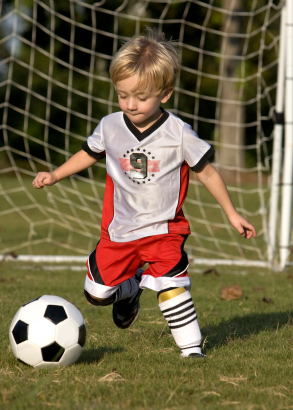Athletic training videos for babies. Soccer and T-ball classes for toddlers. Do they give kids an edge in the increasingly cut-throat world of youth sports or are they just the latest signs of the commercialization of youth sports and that we have become a nation of "helicopter" parents, hovering over our kids, trying to enrich every second of their lives - even as infants - with activities instead of just letting them be kids. 
No edge
One of the reasons some parents give for enrolling their toddlers and pre-schoolers in organized sports programs is the belief that it will give them an edge over their peers when they start team sports when they are five or six, an edge they may continue to enjoy when they get to middle school, high school, and perhaps beyond.
The problem is that there is absolutely no evidence to support that belief:
- Each child follows his or her own unique developmental timetable. Attempts to alter that timetable through early sports programs are destined to fail. Early sports classes aren't going to make a child any more coordinated, any sooner.
- Athletic success involves many factors, including genetics, mental attitude, access to training and money; any attempt to increase the chances of future achievement by teaching skills at earlier and earlier ages simply won't work and may end up backfiring by burning them out and exposing them earlier and earlier to overuse injuries.
- Even if such early training gives a child an edge over his or her peers when they are four, five, six or seven, whether they will still be sports stars when they enter adolescence is virtually impossible to predict: research suggests that only one in four children who are star athletes in elementary school will still be stars when they reach high school.
Parents need to avoid the mind-set that more is better. In many instances, less is truly more.
Don't sacrifice free play
Parents are under enormous pressure these days to help their kids succeed and to keep up with other parents, but the answer isn't to fill every second of their lives with activities. A play date or a trip to the neighborhood playground or kicking a ball around in the back yard are every bit as good at giving toddlers and pre-schoolers the chance to exercise and socialize as a sports class.
Experts, including the American Academy of Pediatrics, continue to emphasize the importance of free, unstructured play in child development. More and more organized activities should not be at the expense of free play, which is critical to healthy child development for a number of reasons:
- Play is critically important to healthy child development. Without play, children will be much less likely to develop just the kinds of thinking we feel are so vital to a productive and intelligent adult life.
- Play is needed for creativity. Believe it or not, boredom is actually good in moderation by stimulating kids to think and create.
- Play helps children learn how to work collaboratively, to share, to negotiate, to resolve conflicts, and learn self-advocacy skills.
- When play is controlled by adults - such as in organized sports classes - children have to follow adult rules and concerns and lose some of the benefits play offers them, particularly in developing creativity, leadership and group skills.
What to look for in a program
If you are thinking of signing your toddler up for sports classes before the age of five look for programs that:
- Emphasize exercise and keep the kids moving, and not organized drills;
- Don't place unrealistic, age-inappropriate expectations on children;
- Are all about having fun; and
- Don't promise to make your child more coordinated or skilled, or give them an advantage when they start organized sports.
Brooke de Lench is the founder of MomsTeam.com and the author of Home Team Advantage: The Critical Role of Mothers in Youth Sports (HarperCollins).








